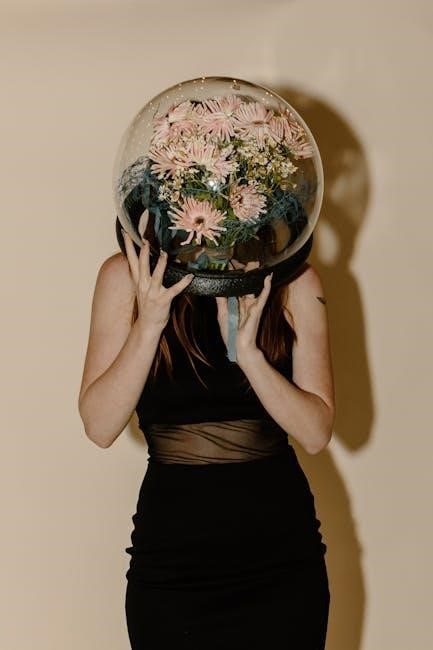Suzan-Lori Parks’ “Venus”: An Exploration
Suzan-Lori Parks’ play “Venus” delves into the tragic life of Saartjie Baartman‚ the “Hottentot Venus‚” exploring themes of objectification‚ racism‚ and exploitation. Parks masterfully uses unconventional theatrical approaches to tell Baartman’s devastating story.
Overview of the Play “Venus”
“Venus‚” written by Suzan-Lori Parks in 1996‚ reimagines the life of Saartjie Baartman‚ a Khoekhoe woman known as the “Hottentot Venus.” The play chronicles Baartman’s journey from South Africa to Europe‚ where she was displayed as a freak show attraction due to her unique physical features. Parks explores themes of objectification‚ racism‚ and colonialism through Baartman’s experiences.
The play uses unconventional theatrical techniques to highlight the exploitation Baartman endured. Parks’ language is poetic‚ adding depth to the narrative. “Venus” examines the historical treatment of Black people‚ specifically Black women‚ within a spectacle. The play depicts Baartman’s rise to fame and subsequent devastation.
Through her play‚ Parks gives voice to a historical figure and challenges audiences to confront uncomfortable truths about the past. The play’s focus is to expose the exploitation and the suffering that Baartman endured during her lifetime‚ thus honoring her life.

Historical Context: Saartjie Baartman
Saartjie Baartman was a Khoekhoe woman who was exhibited in Europe in the 19th century. Her story highlights the intersection of race‚ gender‚ and colonial exploitation during that historical period.
Saartjie Baartman’s Life and Exploitation
Saartjie Baartman‚ a Khoekhoe woman from South Africa‚ endured a life marked by exploitation and tragic circumstances. Lured to Europe under false pretenses‚ she was promised wealth but instead became a spectacle in freak shows due to her physical features. She was cruelly displayed and objectified for the entertainment of European audiences.
Her body became a source of fascination and ridicule‚ reducing her to a mere object of curiosity; Baartman’s experiences shed light on the dehumanizing effects of colonialism and racism. She was befriended‚ bought‚ and ultimately exploited.
Baartman’s story serves as a stark reminder of the historical injustices faced by marginalized communities. Her life highlights the intersection of race‚ gender‚ and exploitation in the context of 19th-century Europe.
The “Hottentot Venus” Label
The label “Hottentot Venus” epitomizes the dehumanization and objectification that Saartjie Baartman endured. It stripped her of her identity‚ reducing her to a caricature based on racist and sexist stereotypes. The term “Hottentot‚” a derogatory name for the Khoekhoe people‚ combined with “Venus‚” a reference to the Roman goddess of love and beauty‚ created a perverse and exploitative image.
This label was used to justify her display as a freak show attraction‚ perpetuating harmful stereotypes about African women. The “Hottentot Venus” label served to exoticize andOtherize Baartman‚ reinforcing the power dynamics of colonialism. It highlights the way language can be used to dehumanize individuals and perpetuate systems of oppression.
The impact of this label extended beyond Baartman’s lifetime‚ contributing to the enduring legacy of racism and the sexualization of Black women.
Themes in “Venus”
Suzan-Lori Parks’ “Venus” explores several poignant themes‚ including objectification and sexualization‚ race and racism‚ colonialism and exploitation‚ and the disturbing nature of the freak show spectacle;
Objectification and Sexualization
In “Venus‚” Suzan-Lori Parks confronts the pervasive objectification and sexualization of Saartjie Baartman‚ highlighting the dehumanizing gaze she endured. Baartman‚ tragically dubbed the “Hottentot Venus‚” was paraded as a spectacle due to her physical features‚ particularly her buttocks‚ which became a focal point of European fascination and exploitation. This objectification reduces her to a mere body‚ stripping her of agency and dignity.
Parks emphasizes how Baartman’s identity was consumed by the prurient interests of white spectators and doctors. Her body was commodified‚ transforming her into a sexualized object for public consumption and scientific scrutiny. The play powerfully exposes the insidious ways in which societal biases can lead to the dehumanization and exploitation of individuals based on their race and physical attributes. This theme underscores the devastating impact of reducing a person to their physical form‚ thereby denying their humanity.
Race and Racism
Suzan-Lori Parks’ “Venus” unflinchingly tackles the brutal realities of race and racism in 19th-century Europe‚ using Saartjie Baartman’s life as a stark illustration. Baartman‚ a Khoekhoe woman from South Africa‚ was subjected to relentless prejudice and discrimination based on her race and ethnicity. The play reveals how deeply ingrained racist ideologies fueled her exploitation and dehumanization.
Parks exposes the racist stereotypes and assumptions that underpinned Baartman’s treatment‚ highlighting the ways in which European society constructed her as “other” and “exotic.” This racialization served to justify her commodification and exploitation in freak shows‚ where she was paraded as a living spectacle. The play underscores the enduring legacy of racism and its devastating impact on individuals and communities‚ emphasizing the need to confront and dismantle systems of racial oppression.
Colonialism and Exploitation
“Venus” powerfully portrays the intertwined forces of colonialism and exploitation that shaped Saartjie Baartman’s fate. Parks exposes how European colonialism enabled the exploitation of African people‚ resources‚ and bodies‚ with Baartman becoming a symbol of this systemic oppression. Lured from South Africa under false pretenses‚ she was transported to Europe‚ where she became a spectacle in freak shows.
The play highlights the power dynamics inherent in colonial relationships‚ revealing how European colonizers exerted control over Baartman’s life‚ body‚ and identity. Her exploitation was not merely an individual act of cruelty but a manifestation of the broader colonial project‚ which sought to dominate and extract value from colonized lands and people. Parks challenges audiences to confront the lasting consequences of colonialism and its continued impact on marginalized communities today.
The Freak Show Spectacle
Parks’ “Venus” vividly recreates the freak show spectacle that defined Saartjie Baartman’s experience in Europe. The play depicts how Baartman was exhibited as a curiosity‚ her body objectified and scrutinized by paying audiences. This spectacle served to reinforce racist ideologies‚ portraying Baartman as “other” and exoticizing her African features for European consumption.
The freak show environment is depicted as a site of exploitation and dehumanization‚ where Baartman was stripped of her dignity and agency. Parks emphasizes the voyeuristic nature of the spectacle‚ highlighting the power imbalance between the audience and the performer. The play challenges audiences to confront their own complicity in perpetuating harmful stereotypes and objectifying marginalized groups. Through its portrayal of the freak show‚ “Venus” critiques the historical and ongoing commodification of Black bodies and the ways in which society profits from the exploitation of difference.

Parks’ Theatrical Style
Suzan-Lori Parks is known for her unconventional theatrical approaches‚ which she employs effectively in “Venus” to challenge traditional narrative structures and engage audiences in innovative and thought-provoking ways.
Unconventional Theatrical Approaches
Suzan-Lori Parks utilizes unconventional theatrical approaches in “Venus” to disrupt traditional storytelling and challenge audience expectations. Her style often incorporates fragmented narratives‚ poetic language‚ and historical revisionism. These techniques serve to highlight the complexities of Saartjie Baartman’s life and the historical context of her exploitation.
Parks’ use of anachronisms and non-linear timelines further contributes to the play’s unique theatricality. She blends historical accuracy with imaginative interpretation‚ forcing the audience to confront the uncomfortable truths of the past. The play’s structure mirrors the fragmented experience of Baartman‚ reflecting her displacement and dehumanization.
Furthermore‚ Parks incorporates elements of the freak show spectacle into the play‚ blurring the lines between performance and reality. This deliberate choice challenges the audience to examine their own complicity in the objectification of Baartman. Through these unconventional methods‚ Parks creates a powerful and unsettling theatrical experience.
Mastery of Language and Poetry
Suzan-Lori Parks demonstrates a remarkable mastery of language and poetry in “Venus‚” crafting dialogue that is both lyrical and provocative. Her use of language transcends mere communication‚ becoming a tool for exploring the inner lives of her characters and the complexities of their relationships.
Parks’ poetic style infuses the play with a sense of heightened reality‚ elevating the story of Saartjie Baartman to a mythic level. The language often reflects the characters’ emotional states‚ shifting from lyrical beauty to harsh brutality as the narrative unfolds. This dynamic use of language amplifies the play’s themes of exploitation and dehumanization.
Furthermore‚ Parks employs wordplay‚ repetition‚ and rhythmic patterns to create a distinctive theatrical language. These techniques serve to engage the audience on multiple levels‚ inviting them to actively participate in the construction of meaning. Her mastery of language is central to the play’s power and its enduring impact.

Critical Reception and Awards
“Venus” received critical acclaim for its powerful storytelling and innovative theatricality. The play garnered significant recognition‚ including prestigious awards‚ solidifying Parks’ reputation as a groundbreaking playwright.
Awards Won by “Venus”
Suzan-Lori Parks’ “Venus” has earned considerable recognition within the theatrical community‚ highlighted by prestigious awards that acknowledge its significant artistic merit and impact. Among these accolades‚ the play was honored with an OBIE Award‚ a testament to its exceptional quality and innovative approach to storytelling. This award underscores Parks’ ability to create a deeply moving and thought-provoking theatrical experience.
The OBIE Award specifically recognized the play’s exploration of complex themes‚ including race‚ objectification‚ and the exploitation of marginalized individuals. “Venus” stands as a powerful example of Parks’ commitment to shedding light on historical injustices and giving voice to those who have been silenced. The play’s critical success and award recognition demonstrate its enduring relevance and its capacity to resonate with audiences and critics alike. Further solidifying Parks’ place as an important voice.

Legacy and Impact
“Venus” leaves a legacy of challenging audiences to confront uncomfortable truths about history‚ race‚ and the enduring effects of colonialism. Parks’ work continues to inspire critical dialogue and reflection.
Suzan-Lori Parks’ Examination of Black People in History
Suzan-Lori Parks consistently examines the experiences of Black people throughout history in her dramatic works. She frequently uses historical narratives to explore themes of identity‚ race‚ and the impact of societal structures on individual lives. Parks’ unique approach involves blending historical facts with elements of magical realism and poetic language‚ creating a distinct theatrical style.
Her plays often center on marginalized figures‚ giving voice to those whose stories have been overlooked or misrepresented. By reimagining historical events‚ Parks challenges conventional narratives and encourages audiences to critically examine the past. “Venus” exemplifies this focus‚ as it sheds light on the life of Saartjie Baartman‚ a woman exploited and dehumanized due to racism and colonialism. This play allows her story to be heard.
Through her work‚ Suzan-Lori Parks contributes to a deeper understanding of the complexities of Black history.
